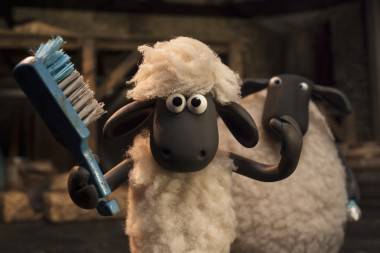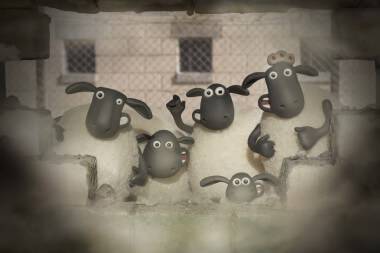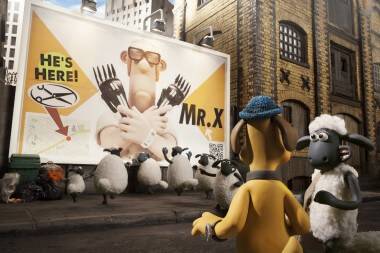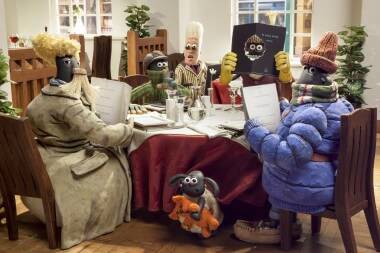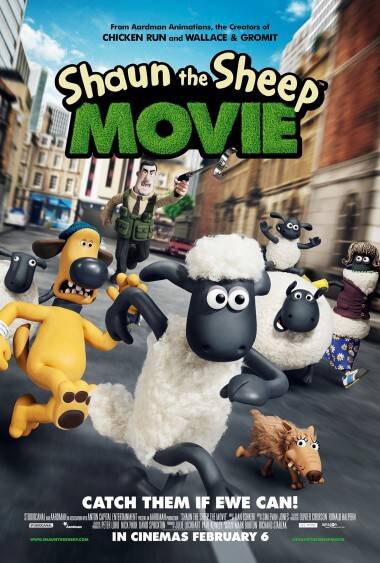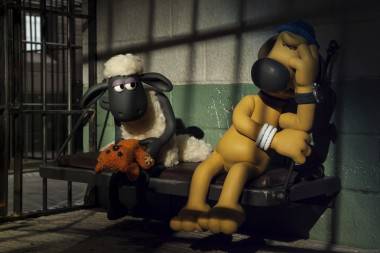Shaun the Sheep The Movie: Interview with Directors Richard Starzak and Mark Burton
Released this week in cinemas nationwide, Aardman‘s very own Shaun the Sheep has teamed up with Studio Canal to bring the adventures from the barn to the big screen. Skwigly writer Nathan Wilkes caught up with writer/directors Mark Burton and Richard Starzak to discuss their new film following the adventures and antics of everyone’s favourite flock. Find out about the perils and pleasures of slapstick film, Aardman Studios’ inner workings and top-secret llamas!
So Aardman are used to silent characters, particularly Gromit – was it hard to master doing an entire silent film? Did you have any difficulties trying to express a lot of the emotion?
Mark Burton: It was a challenge for us trying to do seventy five minutes. Pixar tried thirty minutes and then they wimped out in Wall-E; the first thirty minutes of Wall-E were fantastic. But funnily enough, in terms of expressing the emotion in the story it doesn’t make it hard because a lot of the most powerful communication is non-verbal and they always say you can watch a good film with the sound turned down. So as well as the visual expressions that we can get from the puppets, there is sound and there is brilliant expression that we can get from the voice artists as well. So the challenge in terms of expressing emotion and of not having dialogue wasn’t such an issue for us, it was more making sure you could tell a good story that would last as long as it needed to last.
Richard Starzak: Yeah, the whole non-dialogue thing is sort of an interesting area because initially we did it on the series for economy, and you (Nathan) as an animator know that lip-sync takes a lot of time. We thought we could tell 7 minute stories with no dialogue – in fact as an Aardman tradition, if you look at Nick Park’s early films he’d storyboard them before he ever thought of dialogue so you could clearly see the story and the story arcs of the characters in the drawings and so we extended that into the film.
Aardman started off, obviously, with shorts like you were just talking about. Would you say Aardman has gotten used to the business of making features now they’ve found they’re element?
RS: Yeah I think so, I mean it’s been fantastic for myself and Mark because we co-wrote and directed the film and also had the backup of the studio behind us, now with all the experience of Nick Park and Steve Box as co-director on Were-Rabbit and Peter Lord and Dave Sproxton the company founders – also Paul Kewley and Julie Lockhart, our producers – they’ve got story bones as well. So to have all that help was fantastic! It was like our “brains trust” and it could be tough, they could come in and say “that’s just not working”, they could be quite brutal.
MB: Tough love as they say.
RS: Tough love, yeah, and it worked. It works really well.
MB: I think also you know Aardman’s got a really strong commercial division and there’s a TV series and there’s a half hour coming up, so Aardman is involved in other genres and TV genres and the feature side is obviously one major element that’s gradually getting more and more experience.
Well I’m glad you mentioned the half hour thing because back in October obviously they announced that Shaun The Sheep was getting a half hour special, are you able to tell us anything special about that at all?
MB: That hasn’t really been published yet…
RS: The working title and somehow the synopsis got out onto the internet, I think we managed to get rid of it again, but its, I’ll tell you, it’s called The Farmers Llamas and it’s about the farmer that inadvertently buys some llamas and what happens on the farm as a result, but that’s all I can say.
MB: There will be llamas.
RS: Yes. Lots of Llamas.
MB: Not lots, he can’t afford lots, maybe a few.
RS: That’s a really good Hollywood title that. “There will be llamas!”
MB: That does sound very dramatic doesn’t it? “There will be llamas”, Paul Thomas Anderson’s directing it.
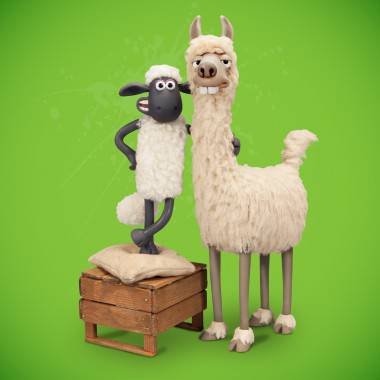
Mark, we’ve seen you in the writing chair for a lot of animated films some from Aardman some from Dreamworks like Madagascar, so what’s it like to sit in the director’s chair for this project?
MB: Well it’s a more comfy, expensive chair but it was a big learning curve for me actually and it had two advantages. One is Golly (Richard Starzak) has a lot of production experience so I was able to go to him for advice, but also all the people at Aardman – the art directors, the designers, the animators, the riggers – they’re all so great that I didn’t need to have all the technical skills. What I was required to bring was storytelling skill and they could help me bring that to fruition. I always describe directing a film at Aardman as getting into the driving seat of a Rolls-Royce because you’ve got the best people around you.
RS: It’s a big comfy car.
Would you say you approached Shaun The Sheep like you were making a kids’ show or like you’re making a slapstick comedy? Is there much difference between the two?
RS: I think the approach was play it straight, take it completely seriously. The writing process was, with Mark’s experience, very vigorous and we had a story and we stuck to it. We made that work. Not a lot of laughs at that point I have to say, even thinking of the jokes isn’t particularly funny. It starts to become funny, I suppose, once you start to visualise it and storyboard it. Actually, the early process we used to make each other laugh by saying “wouldn’t it be funny if the farmer became a hairdresser and shear the sheep as a hairdresser?” There would be lots of that but structuring the story was a very serious process. I think Aardman’s best comedy is when we play it absolutely straight and allow the comedy to come through that.
MB: I think I’d just add to that one thing at Aardman we never do is think of it as a kids’ movie. In fact, with animation, no-one thinks of it as a kids’ thing anymore. Yeah, you might say it’s a family thing but actually me and Richard only did what made us laugh and the story we would come up with would be a story that we would want to see. So you don’t really dumb down or patronise in that sense. I think if you do that it’s going to be the death of it really.
RS: We don’t necessarily think of adult jokes and kids’ jokes either, we just think of gags and occasionally one we’d come up with we’d think maybe was a bit risqué or maybe detract from the story if the kids don’t get it, but apart from that we just went to what made us laugh.
Speaking of risky jokes, we were talking earlier about how The Pirates had a risky joke with leprosy that was taken out for obvious reasons. Were there any jokes like that? Gags that got thrown out in the writing room for being a bit too much?
MB: No, we didn’t throw any gags out, in fact I think they all went in. Some jokes got cut for other reasons. We had a joke, which I think might have made it into a trailer, where the flock are in a city and they see what looks like a happy sheep sign and it turns into a Kebab sign and they run off screaming. We didn’t take it out because we were worried about meat eating or anything, we just felt like it was delaying the story. So in fact, there are a couple of jokes in there, there’s a joke which is actually a reference to the Profumo scandal of the sixties. Christine Keeler and the farmer are sitting on a chair naked in his photo shoot; It’s all done very tastefully I should hasten to add, folks! Again we came up with that idea as an image and just thought well, probably seventy percent of the audience won’t necessarily understand where it’s from but will laugh as it’s a funny image and for thirty percent they’ll get the reference. The one thing we did do actually was a storyline about the farmer getting knocked on the head, which we treat lightheartedly but there’s a sensitive side to it, it’s quite an emotional story and it did gives us an idea to approach a charity called Headway who specialise in helping people with head injuries. We included it all, we didn’t cut anything but we were aware that there’s another side to that and so we approached them.
RS: There’s a slight irony isn’t it? It’s that the whole idea of slapstick is to do with some kind of violence, some kind of pain. It’s enjoying watching other people in pain I think that’s part of the comedy but it’s increasingly more difficult without offending somebody.
I felt like the film was more emotional than a lot of the previous Aardman films and I was wondering, Aardman have their style of storytelling, they’re very quirky and funny in their own way. Is there something about the coupling of the humour and emotion that you think you’ve tapped into with this film, and possibly with Shaun of the future?
MB: It’s nice to hear you say that. In a way that’s for you to say, not for us to say, but I think me and Richard started out saying we wanted to make a film that is funny and touching. So to hear you say that is great for us because we can tick both those boxes. I think people sort of say they treat it as two different things but actually if you’ve got an emotional story and you are rooting for the characters in the story they will be funnier and the jokes will be funnier because you care.
RS: In fact, dating right back to the first series there was an episode where the sheep are trying to stop the farmer from cutting down their tree that they like playing in. He almost cuts it down and he sees a carving of a little smiley face in the tree and he looks back to when he was a kid, playing in the tree and enjoying hanging out of it and right at the end as a kid he’s carving a smiley face in the tree. It whips through to current day and the smiley face is sort of all gnarly and he’s old and bald. We played it in the studio and one of our producers burst into tears and ran out and I thought, that’s good, I made her cry, that’s almost as good as making them laugh! It just struck me that Shaun had the possibility of greater emotional depth than your average children’s TV shows.
MB: To answer the second part of your question, it remains to be seen. Hopefully some of those emotional ideas can carry through to the next series and to the half hour and so on.
It’s almost been eight years since the show started and it’s been going really strong, what’s changed in the way of story and also animation production over time?
RS: I suppose it’s a bit…
MB: We got a bit quicker maybe?
RS: We got a bit quicker, yeah. The stories have changed; I think we just got better. The characters have developed through the process of making the series so it’s easier to know. Once you know the characters I think it’s easier to work out stories for them and I think, like Mark said, the emotional side will feed back into the series as we know the characters a bit more so we can tap into more profound stories now.
What was the most fun part of making the film?
MB: I’m quite enjoying that we’ve finished and now we can just relax. I suppose the most fun thing is when you have an idea for a scene or a joke or even for a character and it works, it’s a great feeling. I’ll give you an example, there was the joke about the psycho pit bull in the prison. We’d had this idea early on and we put it on the storyboards and it was working there and we put it into the film, the character actually doesn’t move in those shots. There’s no animation, it’s just a locked off shot but then we played it for the first time in front of an audience and they roared with laughter. That was a great feeling, that we got that right. To have a gag that’s based on a non-moving character is quite unusual.
RS: There’s a sort of paradox there, we’ve made an animated film and the best laughs are where there’s no animation!
MB: We can make the next one much cheaper if we do that all the time, that’s true.
RS: I still have very fond memories of when you think of a really daft idea like the farmer who shears sheep eventually…
MB: SPOILER ALERT!
RS: Oh am I not allowed to say this?
MB: Yeah you can.
RS: It’s out in the public now that the farmer can become a metrosexual hairdresser; it’s just a really silly idea. I think when we initially said it and laughed we thought it probably wouldn’t stay in the film, but it did. It’s just a delight that such a daft gag developed into a really good storyline.
MB: It’s nice to be able to have your own daft ideas and take them all the way through and not have them taken away from you or replaced by other people’s daft ideas.
Shaun the Sheep The Movie is out in cinemas nationwide Friday 6th February 2015


